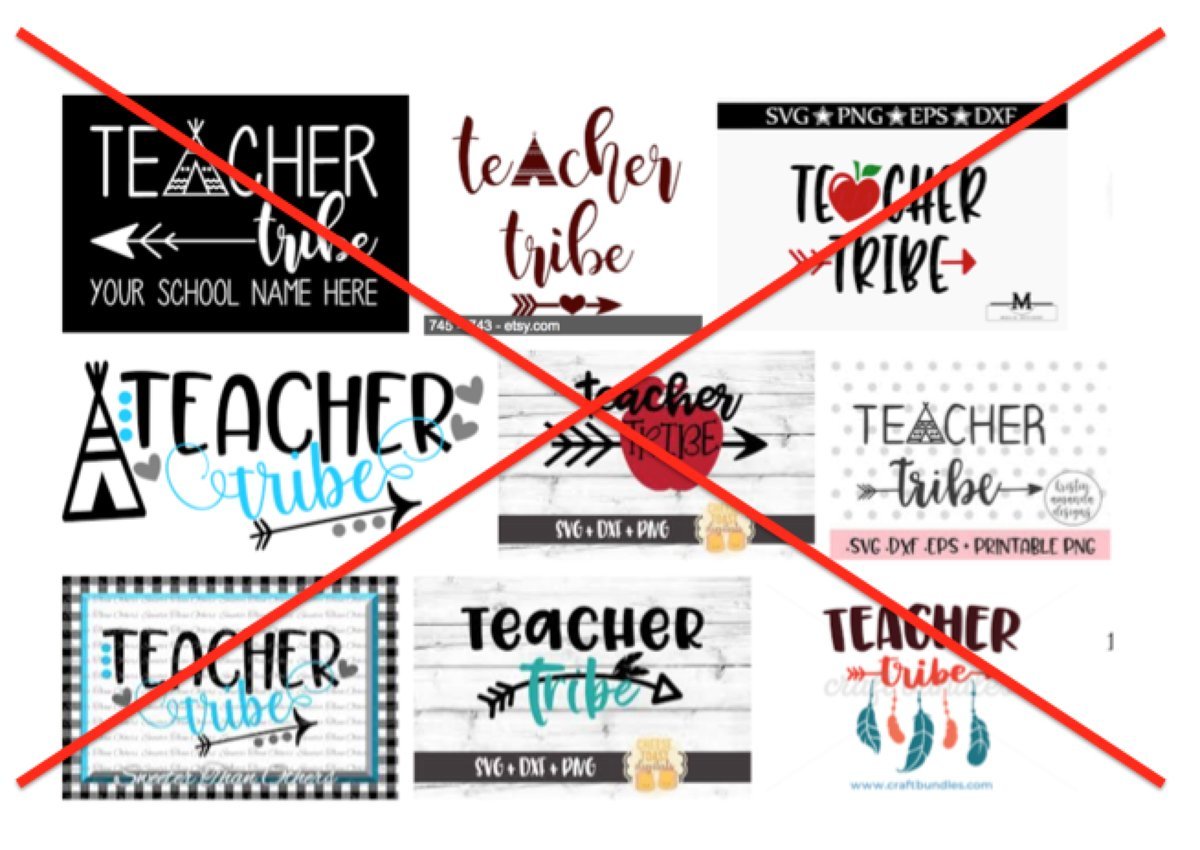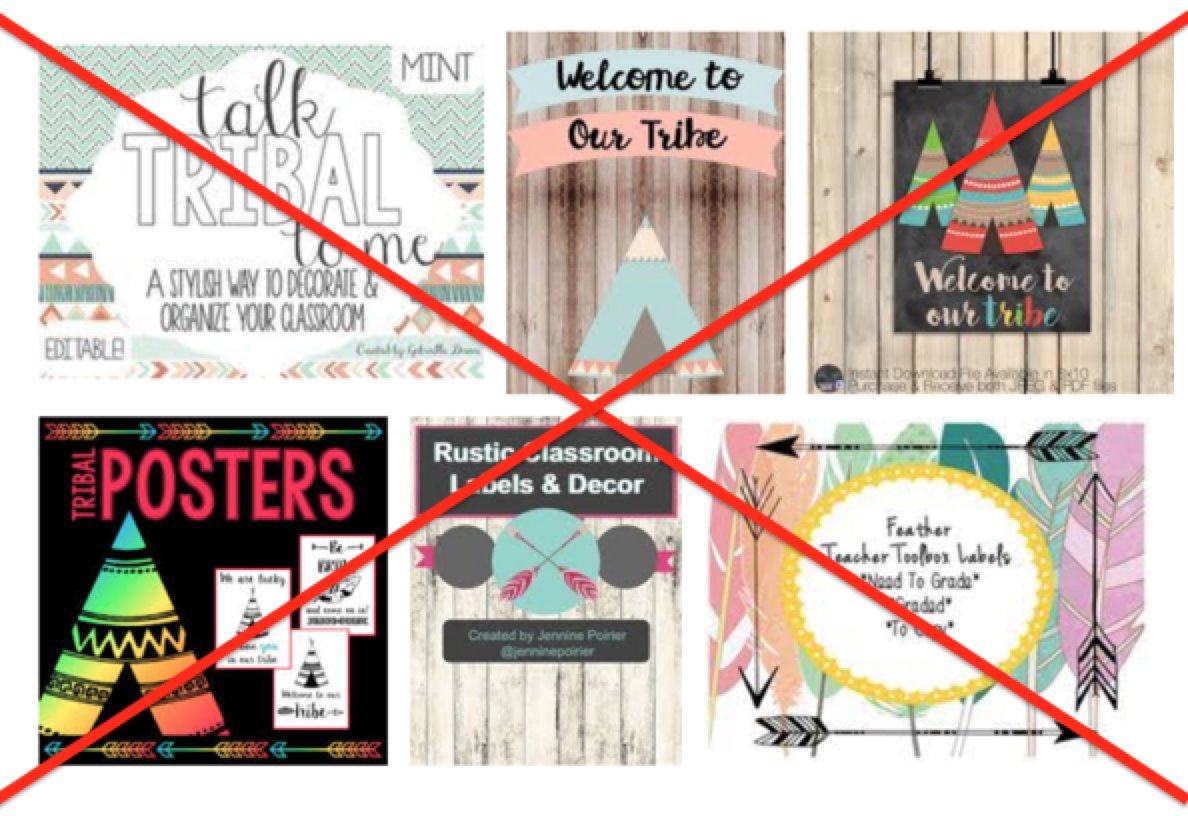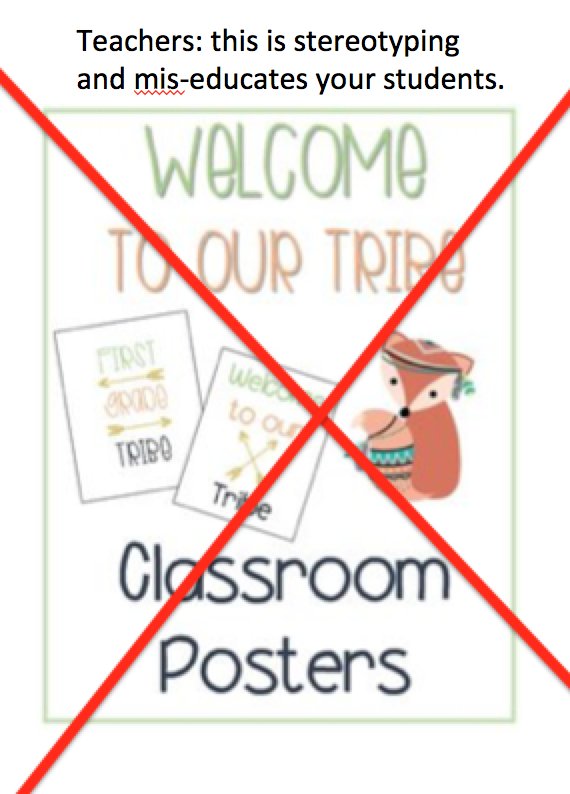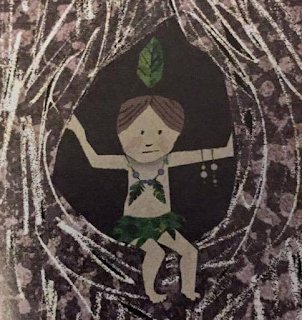Eds. note on Sunday, Sept 9, 2018: Many people responded to the thread I started on Sept. 7. Several asked if I knew about the Tribes Learning Community program. That question prompted me to add to the thread. I am adding the additional tweets as an update at the bottom of the post, along with a summary of some of the responses.
"Some thoughts on the use of the word "tribe" by teachers and schools..."
September 7, 2018
Below is a thread I did on Twitter this morning. I used the spool app to compile the individual tweets so I could paste them here.
_____
"Some thoughts on the use of the word "tribe" by teachers and schools..."
September 7, 2018
Below is a thread I did on Twitter this morning. I used the spool app to compile the individual tweets so I could paste them here.
A conversation is taking place on Twitter, where some teachers are asking other teachers not to use "tribe" to describe their classrooms of students.
Some people are trying to push back on those asking that it not be done. They are pointing to dictionary definitions of the word (tribe) to say that it does not mean only Native people--that it has roots elsewhere.
That's true. The word 'tribe' is not an Indigenous word. It is used to describe many other nations/peoples around the world. But--we are talking about the US. Here, that is precisely what it evokes.
And one need only do some google image searching to see that teachers are definitely using their ideas of Indigenous people to create classroom materials for their "tribe" of kids. (I did the red x overlay to indicate NOPE.)

Here's another one (and again, I added the red x):

And here's another! I could do this all day long. If you are a teacher, please reconsider. This is a new-ish fad, but like many fads, it is harmful. Don't do it!

I took a look at the site "Teachers Pay Teachers" and found many similar problematic ideas there. "Create a tribe" is one. It is like the too-many "what is your Indian name" activities that are everywhere. They draw on stereotypes.
When you do these kinds of activities, teachers, you are introducing and/or affirming stereotypes. Remember! You're a teacher and you have a responsibility to educate children. Stereotypes do not educate! They misinform!
Librarians: when you do these kinds of activities in your libraries, you are also misinforming children.
Writers/illustrators: when you use stereotypes in your books for kids, you contribute to this problem. Case in point: Lane Smith's picture book, THERE IS A TRIBE OF KIDS, and kids in it shown like this: (…ansinchildrensliterature.blogspot.com/2016/07/lane-s…)

Bottom line: there's too many ways this can--will--and DOES go wrong in a society that knows so very little about Indigenous people and our nations. I recommend you step away from using "tribe" to describe your classrooms.
Update on September 9, 2018:
Some are working hard to understand why it is a problem. They see or use the word to describe their (or a friend's) classroom. I appreciate that they're trying to understand. They strike me as receptive to critical thinking. Others are resistant. They assert that they (or their children) are "part Native American" and think that carries weight. A claim to being "part Native American" is used as a defense of mascots, too. These are well-meaning but ignorant and ultimately, harmful to education.
Update on September 9, 2018:
Picking up on my thread yesterday about teachers using "tribe" to refer to their classrooms.... Several people have written to ask me about the pre-packaged "Tribes Learning Community" and its use of "tribes".
I gather it was created in the 1970s by Jeanne Gibbs and that its goal is to create classrooms where there was an emphasis on positive environments in the school and classroom. As the project was being developed, someone said "We feel like a family... we feel like a tribe."
Gibbs and all those involved in the development and implementation of this "Tribes Learning Community" meant well. But I wonder--given the length of time it has been in use--if any of the teachers using it had a Native child in the classroom?
If one of my daughter's teachers had been using it, I would have had a meeting with the teacher. I support efforts to foster a positive environment (I was a classroom teacher, too), but there's no need to use "tribe" to do it.
When I started this thread yesterday, I shared a few images of how "Tribes" materials look. A lot of those materials reference the Tribes Learning Community. Gibbs and her team are probably not monitoring the kinds of materials teachers use when they adopt Gibbs's program.
But Gibbs and her team -- however -- are aware that some question its use. One of their trainers is Ron Patrick. On her website, Gibbs has a letter written by him, defending the use of the word.
Correction: it isn't a letter. It is a statement 'Why the Name "Tribes"'. In it he says his tribe is Eastern Band of Cherokee. In his signature line, he used a phrase I associate with Navajo people (May you walk in Beauty). That's a bit odd, to me.
Also on Gibbs's website is a pdf "What Tribes Are and How They Work" that opens with this:
"A Native American teacher, Paula Swift Robin, is talking with four other teachers at a conference in eastern Washington."Let's look at that sentence, critically.
Why did TLC start with that particular person? With that particular name? I think they are using that person and her identity to protect them from being questioned.
Now let's look at how they described her, as a "Native American." Is Paula Swift Robin a real person? If so, what is her nation? Does Gibbs know that Native people prefer to be identified by their specific nation?
Gibbs writes that the Tribes Learning Community is used in Native schools. There's a comment from a person in one, in Ontario, but I don't think she is Native. If you are Native and it is used in your child's school, what have you seen?
Given that the Tribes Learning Community emphasizes listening and positive classroom environments, I wonder if there's anything in any of their books about stereotyping of Native people? Do they help teachers with any of that?
I can see parts of REACHING ALL BY CREATING TRIBES LEARNING COMMUNITIES online. It has a "Matrix for Achieving Equity in Classrooms." Columns include linguistic bias, stereotyping, invisibility/exclusion. But
... there's a reference to having a "council meeting" where students can make presentations. A council meeting? Hmm...
On page 140 of the book is a:
"Step by Step Process for Group Problem Solving. 1) Ask the tribes to discuss how they feel about people spraying paint on the wall of the school."The "tribes" discuss & then "tribe by tribe" they vote on a solution.
Are there more than one tribe in any given classroom? Or is this example one where all the 3rd grade classrooms (for example) are participating? How does the person managing all of this designate a particular "tribe"? Is it by teacher name?
If you have the book, can you share (in a reply, here) how tribes are delineated?
Summary of responses:
One parent said that her child's classroom has a "tribes agreement" and asks if it is part of the Learning Communities program. It is a key component. She also says that arrows, dreamcatchers, and teepees are everywhere. She plans to speak to the principle and is optimistic.
Many people asked about other words they could use. Others responded, suggesting team, squad, house, and family. In daughter's middle school they used "pathfinders" and "navigators" which I liked ok because they're about action and don't default to imagery that has problematic stereotyping associated with them.
A parallel conversation evolved about the use of "spirit animal." I've written about that before: What is wrong with Buzzfeed's WHAT IS YOUR SPIRIT ANIMAL and Neal Shusterman's UNWIND dystology.
Some raised questions over other problematic phrases. I've been working on a list of them, here: Common phrases.
Some are working hard to understand why it is a problem. They see or use the word to describe their (or a friend's) classroom. I appreciate that they're trying to understand. They strike me as receptive to critical thinking. Others are resistant. They assert that they (or their children) are "part Native American" and think that carries weight. A claim to being "part Native American" is used as a defense of mascots, too. These are well-meaning but ignorant and ultimately, harmful to education.

11 comments:
The word "tribal," a close relation of "tribe," has actually exploded in usage over the last several years, especially to describe current political fracturing in the United States. Is that similarly objectionable?
Also, you have used the word "whiteness" on several occasions. Can you provide a definition of the word as you intend it to be understood?
Thank you.
It would be interesting to do some research, Anon, to chart the use of both words. Neither word is objectionable. How they're used can be, and often is. Your reference to "tribal" being used in this period of political fracturing points to the emotional quality of the fracturing. Another phrase I've heard used a lot in the political arena, in the last few years, is "off the reservation" -- and another is "circle the wagons." The latter two definitely are problematic because the ways that their used is meant to signal "out of control" or under attack, and with the wagons, it points to under attack by Indians.
I use "whiteness" to mean unexamined privilege and institutionalized racism that is, in the US, specific to White Americans. Do you use the term yourself? What do you understand it to mean?
I disagree. I grew up in a predominately Native American area. I am a Caucasian with a half Native child. I see nothing wrong with using the word “tribe”. There are tribes of people all over the world. This is the definition of tribe:
tribe
trīb/Submit
noun
1.
a social division in a traditional society consisting of families or communities linked by social, economic, religious, or blood ties, with a common culture and dialect, typically having a recognized leader.
"indigenous Indian tribes"
synonyms: ethnic group, people, band, nation;
Is not a classroom a community linked by social and cultural ties? This has nothing to do with racism. I suggest asking the Native American community before making this decision for them.
I'm a veteran classroom teacher and have learned so much over the decades about this. I don't see the need for us teachers to use language and phrases that are problematic for First Nation members of the United States community. I do a lot of work and advocacy for Africa (esp Sierra Leone) and have explored the word tribe on that continent. But that is there and we are here. We can use "ethnic group" and other terms rather than tribe. A micro aggression is a micro aggression.
I also think we need to be mindful about "spirit animal" which is so often used. That First Nations find this problematic means we shouldn't use the term. There are plenty of others that can be used instead if we want to ask children to think about what sort of animal they would want to be.
Years ago I used materials and taught in ways I thought were sensitive and now know were not. So I've had to consider, rethink, and rework.
Beth, I suggest taking a quick glance At Debbie's website before admonishing her. Doing so would tell you that not only is she tribally enrolled at Nambe Owingeh, and thus a member of one of the many Native communities in the US, but that she has done extensive research and has considerable expertise in these areas professionally. Your condescension is unwarranted and inappropriate, and your child has nothing to do with the validity of your opinion here.
Dictionaries are descriptive, and not the final word on connotation. I can certainly think of ways to use the word "tribe" that are not about Native communities and nations. Jews, for instance, will often refer to our/themselves as "a member of the tribe," and the reference is, of course, to the tribes of Israel. But in general pop culture in the US, "tribe" is most often associated with Native nations. Why do you think the graphics Debbie reproduces here are full of images of arrows and tipis, if not as references to Native nations? There is a long association of Native peoples and "immaturity," or "primitivity" or other connections to childhood that is insulting to Native people. We should not be perpetuating it.
--Veronica
I am the Anonymous of Sept. 7, at 1:18 pm.
Two good analytic tools every librarian should know about are Google Trends to check the long-term trending for particular search terms, and the BYU Corpus New on the Web (NOW) program that helps to see how often particular words are used in news reporting on the Web. They show interesting and conflicting results for "tribe" and "tribal."
My own sense of tribalism in the political sphere has less to do with emotional fracturing than in the us versus them quality of the discourse. "We" are good, "they" are evil. They are, variously, stupid, racist, snowflakes, any manner of -obic, America-haters, neo-Nazis, etc. Opinions become doctrinaire within the we-group collective, which tend to have clear leaders. Anyone not part of the tribe is a threat and internal purges and suspicion are common.
I don't use the word "whiteness" at all. It is imprecise and overly broad, especially when "white supremacy" already exists and describes the conscious, unconscious, and institutionalized effects you describe. Those effects, by the way, are common in any single-culture dominant society. There's nothing white about them, witness what the Chinese majority is now doing to the Uighur minority, and the lack of openness in many Muslim-majority societies to multiculturalism.
Tribes was part of my training at the Faculty of Ed 19 years ago. .I don’t know where my book is at the moment, but I did see one at school recently.
In the program the cooperative learning groups the class gets divided into are referred to as tribes, so yes there is more than one tribe per class. The teacher decides who is in each Tribe, with input from students usually by asking them to name 4 other students they would like to be with, and then making sure they are with at least one person they want to be with.
I don’t recall there being much in the book about Indigenous people, but it’s been a really long time since I looked at it. I do recall being somewhat uneasy with the name.
Ivriniel,
Do you recall how a teacher distinguished one tribe from the other? I know--it was a long time ago--but if you remember, that'd be good to know.
Thanks,
Debbie
@Beth
Did you even read that definition you posted? Perhaps you noted the words "traditional society" or the fact that the example was "indigenous Indian tribes".
The word refers to a very specific "social division" and "pods" in the classroom--as the standard educational nomenclature calls the groups described in the system above--are in no way comparable to the meaning of the word "tribe".
Debbie, I have a copy of TRIBES from 2001. I haven't been in the classroom for years, but I remember TRIBES activities & philosophy as contributing greatly to positive classroom culture. I think Tribes is an unfortunate choice. Here's an excerpt from pages 72-73.
"When looking for a classroom program that was culturally compatible with First Nation beliefs and values, Tribes was recommended. It surpassed our expectations. Tribes honours the sacred circle in which all people come together. The influence of First Nation beliefs is seen throughout the philosophy, norms, and activites. Tribes has helped us teach the children how to be kind. It has helped the children own their responsibilities. It is helping us to talk and listen to one another, as the old ones still do." - Laura Horton Native Student Retention Coordinator Fort Frances-Rainy River Board of Education Ontario, Canada
ABOUT CALLING THE PROCESS "TRIBES"
At times our Native American friends have asked why this interactive learning process is called Tribes. It's hard to remember exactly when it happened. THroughout the years people who experienced the caring, community-building process kept saying, "This is like being in a family... not a team but a tribe." People appreciated the social support, the respect for individual differences and the sense of belonging that native tribes seem to have. The word "team" never fit because it denoted competition. "Tribes" symbolized the affection and caring that so many of us in Western society long for today.
Richard Burrill, author and anthropologist, has graciously written the paragraph on the next page to give a perspective on the cultural values of tribes not only for Native Americans but for indigenous people since the beginning of time.
THE MEANING OF TRIBES TO INDIGENOUS PEOPLES By RIchard Burrill
Many Native Americans today are experiencing a rebirth as tribal peoples. They realize that they carry insights and virtues that urbanized industrialized civilizations have allowed to fall to the wayside. They honor the Old WAys belief that human beings, animals, plants, and the earth elements are all part of the same one; all part of an interdependent web of life. "Family" includes the land and all living things. It is their way of organizing a caring society.
Consider how, according to the Old Ways, a tribe's members are linked to the land, to the animals, and to each other. "We are all one family," says story-philosopher Grizzly Bear Heart. "We know our place is to protect the web by being guardians of the Great Round House in the sky, our planet Earth. People are not favored over the animals. Animals are not favored over the trees and plants."
In contrast, modern Westerners feel separated from the natural world with their "We are gods," and the rest of nature is not. Modern science touted humankind as masters of nature, that the people's place is to make nature produce. Focus turned to class ranking, and individuals became servants to the wants of empire. In modern society, things are valuables. In tribal societies, people are valuable. Human beings who are the protectors of the land walk in balance. Human beings who live to exploit the land walk out of balance. as far as making the modern world a better place, reclaiming ourselves as earth people, as opposed to empire people, cannot happen fast enough.
-Richard Burrill, M.A., is the author of the new book PROTECTORS OF THE LAND: TEACHINGS OF THE CALIFORNIA INDIANS, as well as ISHI< RIVER OF SORROWS, THE HUMAN ALMANAC, and other books of anthro. significance. He leads groups in cooperative games and songs, and sports workshops that build self-worth and community. Richard's counsel on multicultural education and human development is deeply valued by the author of this book.
If you are not native yourself, your opinion is neither needed nor valuable. When we will STOP TALKING OVER marginalized people??? You don't have to understand why to do what oppressed people have otherwise politely asked you not to do. JUST DON'T. It isn't complicated to be respectful and kind. It's actually incredibly simply. If an autistic person asked you to *not* refer to them as 'a person with autism', that they greatly prefer 'autistic person', just do that! If a black person asks to be called 'black' and not 'colored', just do that!! If an indigenous person asks you not to use the word 'tribe' and not decorate your kid's nursery with tee-pees and arrows, then just DON'T.
Post a Comment